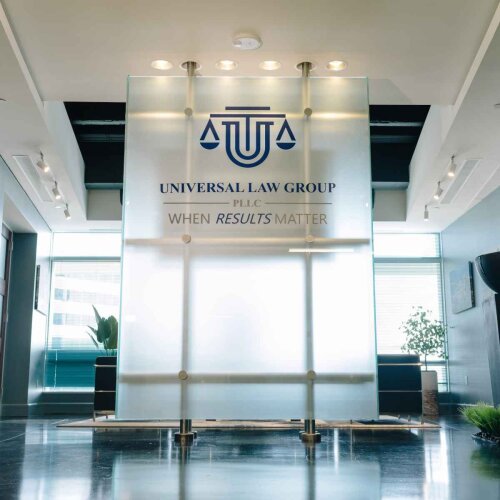Best Education Law Lawyers in Houston
Share your needs with us, get contacted by law firms.
Free. Takes 2 min.
List of the best lawyers in Houston, United States
About Education Law in Houston, United States
Education Law in Houston, as well as in the broader state of Texas, encompasses a wide range of legal issues related to the education system, including but not limited to student rights, teacher contracts, discrimination, special education, and school governance. This area of law ensures that schools comply with federal and state educational requirements, and provides a framework for how conflicts within educational settings are resolved. Local school districts, including the Houston Independent School District (HISD), must adhere to state and federal regulations, ensuring fair and equitable education for all students.
Why You May Need a Lawyer
There are numerous situations in which you might need legal help related to Education Law in Houston:
- Special Education: If your child has special needs, you may require legal help to ensure that their Individualized Education Plan (IEP) is adequate and being properly implemented.
- Disciplinary Actions: Legal representation might be needed if a student faces suspension or expulsion that may be unjust or improperly conducted.
- Discrimination: Cases involving discrimination based on race, gender, disability, or national origin may require legal intervention to ensure compliance with civil rights laws.
- Teacher and Staff Issues: Teachers and other educational staff might seek legal assistance in matters such as contract disputes, wrongful termination, or discrimination in the workplace.
- School Governance: Legal issues can arise regarding the management and policy decisions of school boards or districts.
Local Laws Overview
In Houston, education laws are enforced under the broader Texas Education Code, which governs all aspects of public education. Key legal aspects include:
- Compulsory Attendance: Texas law mandates that children between the ages of six and eighteen attend school, with certain exceptions.
- Special Education Services: Schools must provide appropriate services and accommodations under the Individuals with Disabilities Education Act (IDEA).
- Anti-Discrimination Policies: Protections are in place under Title VI of the Civil Rights Act and Title IX of the Education Amendments to prevent discrimination on various grounds.
- Student Discipline: Schools must adhere to due process in student disciplinary actions, ensuring fair treatment and the right to appeal.
Frequently Asked Questions
1. What rights do students have in a disciplinary action?
Students have the right to due process, which includes receiving notice of the charges and an opportunity to present their side of the story.
2. How can I ensure my child receives appropriate special education services?
You can request an evaluation for special education services and review the IEP proposed by the school to ensure it meets your child's needs. Legal assistance may be sought if disagreements arise.
3. What constitutes discrimination in schools?
Discrimination in schools involves any unfair treatment based on race, color, national origin, sex, disability, or age that interferes with a student's education.
4. Can I challenge school district policy?
Yes, if you believe a policy is unlawful or harmful, you can challenge it by speaking with school administrators or taking legal action if necessary.
5. Are teachers entitled to challenge a contract non-renewal?
Yes, teachers can challenge a contract non-renewal if they believe it was unfair or violated their rights. Legal counsel can provide guidance in such cases.
6. How are bullying incidents handled in schools?
Texas law requires schools to have anti-bullying policies and procedures. Incidents should be reported to school authorities who should investigate and take appropriate action.
7. Can international students attend public schools in Houston?
Yes, international students can attend public schools in Houston if they meet certain requirements, including documentation of residency and legal status.
8. What is the role of a school board?
A school board oversees the management of a school district, develops policies, and ensures compliance with state and federal laws.
9. Are private schools subject to the same laws as public schools?
Private schools in Texas are subject to less regulation than public schools but must comply with certain health, safety, and accreditation standards.
10. What should I do if my child is expelled from school?
If your child is expelled, you should review the school’s disciplinary policy, consider filing an appeal, and seek legal advice to explore possible options.
Additional Resources
For further assistance, consider reaching out to these resources:
- Texas Education Agency (TEA): Provides guidance on statewide educational policies and resources.
- Houston Independent School District (HISD): Local policy information and additional resources for parents and educators.
- Legal Aid Organizations: Organizations like Lone Star Legal Aid offer free legal services to those who qualify.
- Advocacy Groups: Groups like Disability Rights Texas advocate for the rights of students with disabilities.
Next Steps
If you require legal assistance in Education Law, consider the following steps:
- Document Everything: Keep records of all communications, documents, and incidents relating to your legal issue.
- Consult with a Lawyer: Seek out a lawyer specializing in Education Law to discuss your case and options.
- File Complaints if Necessary: Depending on the issue, you may need to file a complaint with the appropriate school authorities or state agency.
- Explore Alternative Dispute Resolution: Consider mediation or other forms of conflict resolution as a less adversarial option.
Lawzana helps you find the best lawyers and law firms in Houston through a curated and pre-screened list of qualified legal professionals. Our platform offers rankings and detailed profiles of attorneys and law firms, allowing you to compare based on practice areas, including Education Law, experience, and client feedback.
Each profile includes a description of the firm's areas of practice, client reviews, team members and partners, year of establishment, spoken languages, office locations, contact information, social media presence, and any published articles or resources. Most firms on our platform speak English and are experienced in both local and international legal matters.
Get a quote from top-rated law firms in Houston, United States — quickly, securely, and without unnecessary hassle.
Disclaimer:
The information provided on this page is for general informational purposes only and does not constitute legal advice. While we strive to ensure the accuracy and relevance of the content, legal information may change over time, and interpretations of the law can vary. You should always consult with a qualified legal professional for advice specific to your situation.
We disclaim all liability for actions taken or not taken based on the content of this page. If you believe any information is incorrect or outdated, please contact us, and we will review and update it where appropriate.










